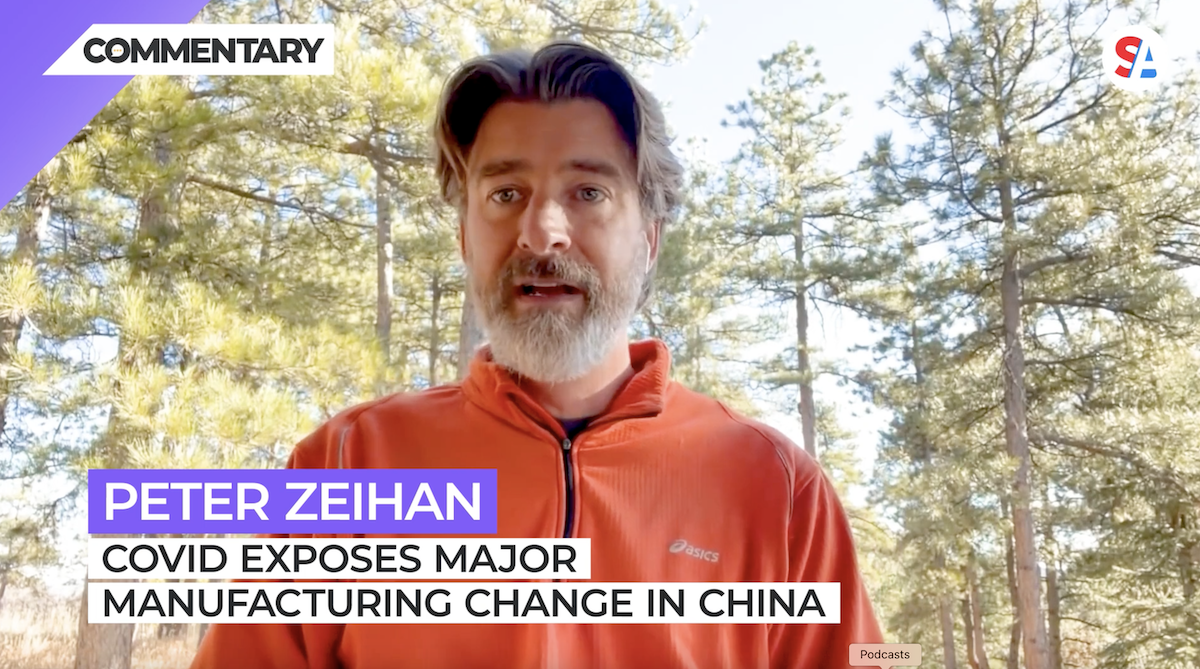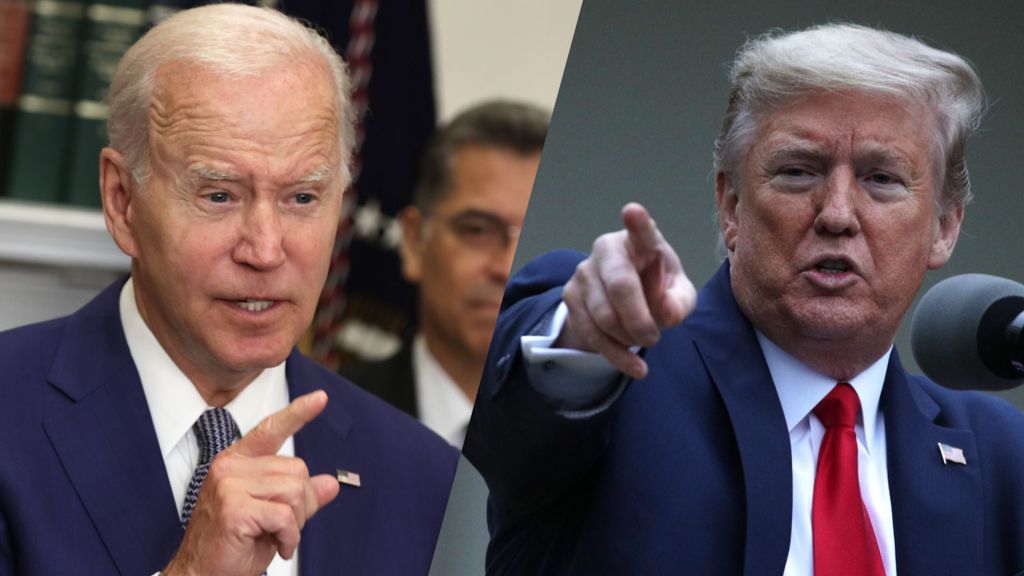
Commentary
-
Our commentary partners will help you reach your own conclusions on complex topics.
Hello from Colorado, Peter Zion here. I thought it would be a good time to talk about a couple of China supply chain, COVID-related things.
We’ve had quite a bit of evolution in the way that manufacturing has been dealing with COVID. And most of the United States and Mexico and east Asia have had some sort of lockdown policy.
Whenever an outbreak happens now in east Asia, they’ve gone through a series of protracted lockdowns, like what we did in North America in March, April, and May of 2020, which means that in a lot of east Asia we’ve had severe economic outcomes as the entire system shuts down. Now that is letting up, people have decided for various reasons because vaccination rates are rising or because they can’t afford to do more lockdowns. I mean, some of these countries have locked down six times that they have to open up again.
And what that means is instead of getting large scale lockdowns that lockdown the entire country, you get limited lockdowns that only lockdown individual facilities. This is actually worse from a supply chain point of view because if you have a national lockdown, then you can carve out exemptions for this or that class of work or a facility. But then if you get COVID now in a facility, you have no choice but to lock it down. So we’re actually seeing more disruption in the next few months than we have seen in the past year and a half. That’s obviously bad.
But what is really going on that is really going to challenge the system at large is what’s going on in the people’s Republic of China. Now the Chinese have a zero-tolerance COVID policy. So when a case pops up, the whole province locks down, the province of Zhejiang is the one that’s going into lockdown right now. This is kind of the most industrialist part of China. It is just across the bay from Shanghai. It involves the port of Ningbo, which is the world’s largest. And in order to get the outbreak under control, the Chinese have already closed a whole fleet of factories across pretty much every manufacturing sector that you can imagine from medical equipment to petrochemicals, to automotive, to toys. They have heavily restricted truck traffic, and they now have a quarantine policy for the port itself so the truck drivers have to quarantine on their way in and on their way out, which means that no truck drivers want to go in.
So in effect, the port of Ningbo, while not technically closed down is certainly operating at a small fraction of its potential capacity.
Now, the issue here is twofold. Now, number one, China’s vaccine doesn’t work, which means that they have to maintain their zero tolerance policy.
If they open up, they get rapid province and countrywide outbreaks that would absolutely crush their health system and destroy whatever political legitimacy the communist party thinks it still has.
It’s only going to get worse in the months to come because COVID, the original strain out of Wuhan, was triple the communicability of the flu. The Delta strain that we’ve been struggling with for the last several months is triple the communicability of the original Wuhan strain. And now Omicron is twice to triple the communicability of Delta, which means that we’re dealing with the pathogen that is the highest communicability of any disease out there right now.
And the Chinese are discovering in bits and pieces that they can’t keep everything out. So we’re gonna see more and more lockdowns throughout the Chinese system.
The second big problem is legitimacy between a financial breakdown, a demographic implosion, a housing implosion, populist issues challenging the trade industry, and the United States under first Trump and now Biden having a more and more and more aggressive position versus China on economic issues.
We have a China that is becoming decoupled from the global system, not so much out of choice, but because out of circumstance. The most, the easiest, the most effective way to counter that would be to do away with the zero COVID policy, but they cannot do that and maintain domestic legitimacy.
So American manufacturers and porters, beware. The Chinese communist party no longer sees mass employment in general or participating in global manufacturing supply chains in specific as primary sources of legitimacy.
They see health as their last chance, and because their vaccine doesn’t work, their only option to maintain that one last read of legitimacy is lockdowns that destroy their manufacturing sector.
It’s not gonna be much longer before the Chinese are no longer participating in global manufacturing supply chains in a very big way. One, they’re not very reliable anymore. And two, they don’t see it as something that is any longer core to their system.
And so if you are involved in the world of manufacturing or consumption or imports or transfers or whatever it happens to be that’s China-centric, you’re gonna have to find a new way of operating very soon. Okay. That’s it for me. I hope everybody’s having a great December until next time.
-
Are Russia’s hypersonic missiles too good to be true?
Russia has reportedly used five of its new hypersonic Zircon missiles to target Kyiv since the beginning of 2024. Russia claims that these sea-based missiles, boasting a range of 625 miles and capable of traveling at nine times the speed of sound, are part of its family of “superweapons” aimed at penetrating the U.S. missile…
-
Norway sending F-16s to Ukraine
In recent months, the need for Ukrainian air defenses has grown more urgent. As U.S. aid is unable to pass through Congress, Ukraine’s European allies have been stepping up to provide what they can. Norway is now the latest nation to pledge F-16s to Ukraine, not only to defend Ukrainian airspace, but also for the…
-
Russians targeting civilian emergency crews in Ukraine
Russian forces are applying a brutal tactic in their war on Ukraine. The tactic, “double tap,” includes an initial strike on a specific civilian target of some value, followed by a second strike intentionally designed to kill the emergency first responders, medical staff, firefighters, and other key personnel dispatched to the location of the first…
-
Iranian strike on Israel not intended to provoke regional war
Rising tensions in the Middle East boiled over again on Saturday, April 13, when Iran launched a direct attack against Israel with over 300 combined armed drones, ballistic missiles and cruise missiles. The attack follows decades of simmering conflict between the two nations, amplified most recently by Israel’s invasion of Gaza and a strike on…
-
The trouble with ‘good’ demographics
Declining birth rates throughout much of Western Europe and America, and in other developed nations like Japan, have alarmed social scientists. Concern is most acute in nations where a shrinking workforce will be expected to pay for the rising costs of a much larger retiring population. But on the opposite end of this spectrum, rapid…
Latest Stories
-
 Getty Images
Getty Images
More Dems signal willingness to save Johnson from speakership vote
-
 Getty Images
Getty Images
NASA worm returns as interest in space grows around the world
-
 Reuters
Reuters
SF DA seeks restitution for drivers delayed by Golden Gate Bridge protest
-
 Getty Images
Getty Images
Mexico disrupts China’s potential plan to infiltrate US EV market
-
 Getty Images
Getty Images
Free speech fight after USC cancels valedictorian’s speech
Popular Opinions
-
In addition to the facts, we believe it’s vital to hear perspectives from all sides of the political spectrum.
Latest Opinions
In addition to the facts, we believe it’s vital to hear perspectives from all sides of the political spectrum. We hope these different voices will help you reach your own conclusions.
The opinions published in this section are solely those of the contributors and do not reflect the views of Straight Arrow News.

















Latest Commentary
We know it is important to hear from a diverse range of observers on the complex topics we face and believe our commentary partners will help you reach your own conclusions.
The commentaries published in this section are solely those of the contributors and do not reflect the views of Straight Arrow News.
Peter Zeihan
Geopolitical StrategistNorway sending F-16s to Ukraine
Russians targeting civilian emergency crews in Ukraine
Iranian strike on Israel not intended to provoke regional war
Dr. Frank Luntz
Pollster and Political Analyst‘Take the job seriously’: Why Americans are fed up with Congress
‘If we can shrink it, it will stop growing’: Americans talk debt, deficit
‘I don’t think they care’: Undecided voters explain their reasons
Pete Ricketts
U.S. Senator for Nebraska